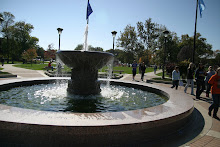
By Michael Baumann
Perhaps you’ve noticed it, too.
This semester is hard. Students across the board are singing the same song: this semester is the hardest I’ve ever had.
Why?
“I know for me and almost everyone I’ve talked to that it will be glorious when this semester is over,” said senior Justin Alvis.
“This semester is by far the most difficult.”
But that’s not a bad thing, said Alvis.
Junior Rachel Horan agreed: “The teachers are asking a lot more of the students lately. I think that’s good. It’s holding me more accountable, helping me to improve and push myself.”
And it’s not an accident, either.
Although not explicitly instructed to instruct differently this year, during a faculty retreat this past summer, most of your professors read the book “Academically Adrift: Limited Learning on College Campuses” by sociologists Richard Arum and Josipa Roska.
The book asks the primary questions: in the face of ratcheting tuition rates, why does college enrollment continue to increase? More importantly, do the undergrads learn anything once they get there? Is forking over fortunes for a four-year degree ultimately a fair trade?
During the second half of the retreat, your professors discussed the Lumina Foundation Degree Qualifications Profile.
The Lumina Foundation for Education is an Indianapolis-based organization that aims to enroll and graduate more college students with quality degrees. The Higher Learning Commission, the largest of six national college accreditation agencies, is backing the Lumina Degree.
The Lumina Degree focuses on not only specialized knowledge (a major or minor), but also applied learning, civic learning, broad knowledge, and intellectual skills. Unlocking the secret to expanding these five areas of learning will hopefully generate undergraduates with real-world credentials that far exceed those current.
On September 21, President Elsener addressed the university, stating that the Lumina Degree will “clearly define how students… see the world and the human person in terms of our career goals, gifts, and calling.”
After reading “Academically Adrift” and discussing the Lumina Degree, Marian’s teaching team reflected on Marian’s image as an educational institution and how we size up compared to other schools.
Of course, the idea of accreditation is “not new,” said Dr. Tom Enneking, Marian University’s Provost.
“Marian has been looking into this since the ’90s,” he said. But now, Marian is looking into direction from a regional accrediting body (the HLC).
“We’re reevaluating what makes us produce good students and how to measure it,” he said.
The application of the Lumina Degree to Marian will be a long process, according to Enneking, The faculty hope eventually to create individual assessments and strategies for each student, “but we’re lightyears away from that,” said Enneking.
Another driving force to improving education is, of course, financial accountability. “It’s a public saying: ‘are you accountable?’” said Eneking. “Who is holding you accountable to doing a good job?”
The answer? Buyers. Students and their parents want to get what they’re paying for, and at Marian, that diploma is worth about $850 a week. Tuition, fees, and books for the 2011-2012 school year total at $27,200.
Enneking made the important distinction that students “are not buying a diploma; they’re buying the opportunity to earn it.”
Alvis agreed: “I’m thrilled at my education thus far at Marian. Growing and being challenged is part of the game. Part of what we’re paying for.
“I mean, that’s why we’re here.”
This past Tuesday in the Ruth Lily Student Center, an education open forum included presentations about academia and enrollment updates and plans from deans of every school at the university.
According to Enneking, more meetings are to come this year. Although faculty focused, Enneking hopes to incorporate student life.
“At a school like Marian? We have to,” he said.
President Elsener also said, “It’s profoundly transformational to be educated so you can be a profoundly transformational figure in this world.”
But who ever said that would be easy? This semester, it seems, is hard—but for a reason: Marian teaches students to become world-changers.
“I’m all about that,” said Alvis.
“I would be absolutely thrilled if the level of expectation were raised so students can raise their game, too, if that’s fair.”
